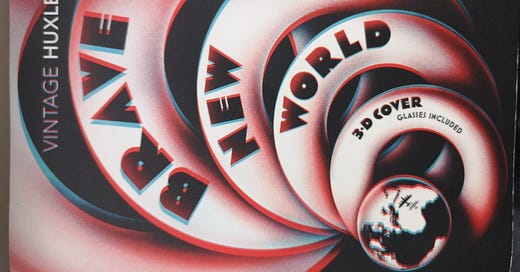When I was thirteen, my older brother breathlessly explained the famous opening scene of A Brave New World. He was reading it in school and was gripped by it.
“In the future, everybody will grow in test tubes! Bureaucrats will determine your social status before your birth!”
I couldn’t tell if he was excited or horrified.
Science fiction written in the last 20 years is much more introspective. Time travel is possible through DMT in your mind (Recursion). Kids in sensory deprivation tanks fight demons threatening their hometown (Stranger Things). Aliens show us how to time travel by internalizing their circular kind of language (Arrival).
Science fiction is, after all, how humans try to imagine the future. In the 50s, society was the cause of all our problems and the potential source of utopia.
These days, our fiction suggests the individual and her perceptions are the centers of all our problems–and the source of all of our solutions.
This seismic shift from being externally focused to being internally focused is the by-product of an emerging field of science that tell us, strangely, each of us is the center of the universe.
Psychedelic research
Dr. Roland Griffiths is conducting famous and groundbreaking studies into the measured positive effects of psychedelics. The results are so unprecedented that scientists don't have enough "holy shit" language to convey them.
For example, nothing positive happens if a person eats 20 grams of mushrooms but doesn't personally "see" God. The results aren't caused by the chemical itself, but rather by the person's subjective mystical experience.
That's fucking weird.
This disrupts the entire premise of 200 years of science in the West (which produced your iPhone, by the way), which assumes that everything important can be measured in the objective world.
Griffiths thinks this is so revolutionary that we will unpack this for fifty years.
“This is a window into the nature of consciousness.”
Old science is at a dead end. It’s happening in other areas of study, too (by the way, no need to understand the following examples fully–I don’t):
In physics, for instance, there’s the “observer effect” (you looking at matter changes its state). In biology, there is “emergence” (dumb things together become smart [think: a school of fish]). Nobody has a damn clue how consciousness works, despite working on it for forty years.
The important takeaway is: your subjective experience is somehow helping create the universe (I know).
Science fiction says YOU will save the future
Consciously or not, these scientific developments grip the fantasies of our science fiction writers. We see it on TV, in the movies, and novels.
YOU are the source of salvation for the ever-desperate world.
“Deep in the human unconscious is a pervasive need for a logical universe that makes sense, But the real universe is always one step beyond logic.” – Frank Hebert, Dune.
For me, this realization brought a heavy burden. Suddenly, everything I thought, said, and did really mattered. It was the opposite of egoism–it was a profound humility.
When I allowed myself to get enraged by traffic earlier today, I sensed, even when alone, my behavior might ripple outward forever into eternity.
It’s (more than) worth noting that this is exactly what the mystics in India have been saying for thousands of years. This is a very exciting shift in perception for us in the West. But it's also a terrifying one.
How will we make do without the firm ground of the objective world?
The shift also suggests that everything wrong with our entire society is somehow your fault. That’s heavy. Having no one to blame is too much of a burden for many of us to carry.
Dostoevsky (a Christian Orthodox novelist with mystical tendencies) had an intuition for this, too:
“Every one is really responsible to all men for all men and for everything.”
If this is true, here’s the good news: If we could each bear to take responsibility for the entire world with a sense of higher nobility (a term lost to modern people), we would usher in the fantastical utopias written about in science fiction. Only without a tyrant at the helm because it comes from within each of us.
Instead of dreaming about a perfect society, let’s continue to dream about perfecting our inner world. Heaven may be real, but we won’t get there by trying to control other people.
For me, this means that everything I do matters. It matters how I talk to my mom, how I treat homeless people in LA, and how I bend the truth to sound cooler than I am.
It’s too much to bear. It’s also exciting.
Thanks for reading,
Taylor
P.S.
What I’m reading:
I had the great pleasure of hearing The Cultural Tutor speak this week. He writes readable threads on moments of history. My insider advice? Focus on craft. Read a lot.
Quotes I’m pondering:
“The end justifies the means. But what if there never is an end? All we have is means.” — The Lathe of Heaven by Ursula K. Le Guin
“‘It is the secret of the world,’ Gal says, her voice digitizing and crackling, ‘that all things subsist and do not die, but retire a little from sight and afterwards return again.’” — Infinite by Jeremy Robinson
“The more that consciousness is influenced by prejudices, errors, fantasies, and infantile wishes, the more the already existing gap will widen into a neurotic dissociation and lead to a more or less artificial life far removed from healthy instincts, nature, and truth. The general function of dreams is to try to restore our psychological balance by producing dream material that re-establishes, in a subtle way, the total psychic equilibrium.” — Carl Jung




